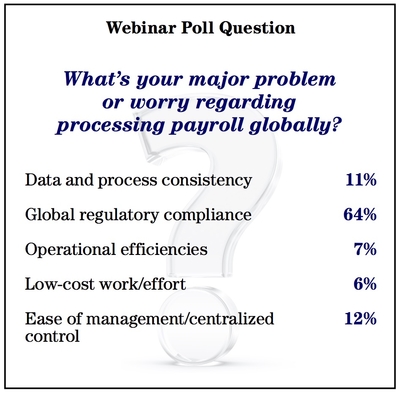Contrary to popular belief from outside the payroll industry, payroll is a critical part of a company’s overall strategic planning.
While many would say payroll is simply a “back-office function,” David Reichert, Director of Product Management with Radius, disagrees.
During a recent webinar, “Global Payroll: Are You Meeting Your Obligations?” which is currently available on-demand, Reichert explained why employers should understand the importance of global payroll in their organizations.
Oftentimes, Reichert said, global payroll is much more complex than having a single pay engine delivering net pay across the globe or a system in place that handles all local currencies, languages, and taxes.
“Understanding a little about the landscape is the first step,” Reichert said.
An initial meeting with your team is probably a good idea to make sure everyone knows where global payroll falls in terms of the company’s priorities. Once you get a perception of what global payroll means in your company, everyone can move forward together.
“Payroll doesn’t exist in isolation,” Reichert said. “It needs discussion and planning with HR. Compliance is also a very important factor.”
When it comes to compliance, Reichert encourages companies to look into hiring an advisory service that can provide HR/payroll with specific rules and related compliance advice, help assist in planning, and remediate problems that may come up. At Radius, Reichert said, the company has also built compliance directly into its web application platform, which provides a calendar of compliance-related events.
“The whole process of getting set up for payroll is tied to having information for compliance to meet compliance-related obligations,” Reichert said. “At Radius, we’ve brought HR and payroll together and complimented them with advisory services.”

It’s easier said than done, however, with the number of challenges companies will confront as they prepare to expand globally. These include cultural differences, time zone challenges, and different technologies and systems. Reichert also highlights the challenges for companies that are lacking in global leadership and resources.
“This is where the importance of governance comes in,” Reichert said. “You end up spending 90% of your time on 10% of your workforce because you’re flying blind in a lot of these new markets and have a lot of remediation to do in order to be compliant for that particular payroll in that particular country.”
Reichert hopes companies realize they cannot rely solely on one payroll director to manage something as complex as global payroll and know every rule in the books. That director needs support.
“The way to get that support is to ask for it in a very professional and strategic manner,” Reichert said. “We don’t want global payroll responsibility to just be thrown over the wall. We really want some infrastructure in place so we can address these challenges in a streamlined way.”
View the full on demand webinar for more information.